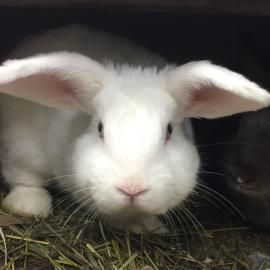Protecting the Rabbits of Our Community from Rabbit Hemorrhagic Disease Virus 2 (RHDV2)
To safeguard our population of rabbits in the shelter, and to prevent the potential spread of rabbit hemorrhagic disease virus 2 (RHDV2), Multnomah County Animal Services (MCAS) is taking special precautions, and asking the public to be observant for any potential cases of the disease.
- What is rabbit hemorrhagic disease virus 2 (RHDV2)
- Recent Cases of RHDV2
- If you find a deceased rabbit
- If you are caring for rabbits
- If you find a stray rabbit
What is rabbit hemorrhagic disease virus 2 (RHDV2)
RHDV2 is a viral disease that causes sudden death in rabbits - wild or domestic. The virus is highly contagious among rabbit populations and can spread through contact with infected rabbits, meat, fur or materials coming into contact with them. RHDV2 poses no human health risk, and also does not pose a risk to dogs or cats. The virus only infects rabbits.
Recent Cases of RHDV2
The first case of RHDV2 in Multnomah County was reported to the Oregon Department of Agriculture (ODA) on July 26, 2022, after 7 of 21 rabbits died over a 72-hour period. An ODA district veterinarian investigated, and OSU confirmed RHDV2 on July 28. The owners of the rabbits report exposure to wild rabbits in the area.
The first case in our region was confirmed on March 26, 2021 by the Oregon Department of Agriculture (ODA) in a group of rabbits found in Milwaukie, OR.
If you find a deceased rabbit
If you find a deceased rabbit, or if your rabbit has died suddenly or unexpectedly, please report it directly to the Oregon Department of Agriculture (ODA) in order for them to track the virus's presence and movement.
Please call 1-800-347-7028 or visit https://oda.direct/RHD to report domestic or wild rabbits which are suspected to have died from RHDV2.
Deceased rabbit handling
- Wear disposable gloves when handling rabbit carcasses.
- Double bag carcasses and spray outside of the bag with disinfectant.
- Wash hands with soap and warm water after handling carcasses and removing gloves.
- Dispose of gloves in trash headed to a landfill.
- Follow additional instructions from ODA on what to do with the carcass.
If you are caring for rabbits
Consult with your veterinarian. If any signs or symptoms of RHDV2 are present, please call ODA at 1-800-347-7028 to report a potential case.
Learn more about vaccination clinics and resources for domestic rabbits
- Minimize exposure to wild rabbits and hares by keeping your rabbits in hutches or cages that are elevated off the ground.
- Keep pet rabbits inside to avoid exposure to environments potentially contaminated by wild/feral rabbits or by people, vehicles, or implements that can spread the disease.
- Do not allow your rabbits to graze or roam in a yard if wild rabbits are present in your area.
- Restrict visitors to your rabbitry and limit the handling of the animals by visitors.
- Avoid transporting or importing domestic rabbits.
- After visiting a show, fair, or meeting where rabbits were commingled, shower and change clothes before handling your rabbits.
- Quarantine new rabbits away from existing ones for 30 days.
- Know the health status of the rabbitry from which you purchase rabbits.
- Keep dogs, coyotes, insects, birds, rodents, and other animals away from your rabbits, as they may carry disease.
- Be aware of the state’s rabbit disease status or country of origin of any equipment or supplies you are purchasing.
- Wash and disinfect hands, clothing, gloves, footwear, cages, and equipment between rabbits from different sources. (RHDV is inactivated by 10% bleach to water solution.)
- Immediately contact ODA (800-347-7028) if you suspect RHD or have sick or freshly dead rabbits.
Learn more about how you can protect your rabbits from RHDV2
If you find a stray rabbit
If you find a stray rabbit in your yard, please keep them separated from any of your own pet rabbits, and observe them. If you have direct contact with a stray rabbit, wash your hands and your clothes before interacting with any of your own rabbits. There is no risk of the virus affecting any other species of animal in your home other than rabbits.
Look for signs and symptoms of RHDV2
- Rapid death
- Fever- if a thermometer is unavailable, very hot or cold ears may indicate fever in rabbits
- Trouble breathing
- Appearing tired, and not moving a lot
- Not interested in eating or drinking for long periods of time
- Strange neurological behavior such as abnormal movement, weakness, difficulty moving or balancing, head tilting, repetitive eye movement, seizures, tremors, or paralysis in one or several limbs.
- Excitement or paddling
- Strange noises or vocalizing
- Nose bleeds or frothy nasal discharge at death
If any signs of RHDV2 are present, please call 1-800-347-7028 to report a potential case.
Finding the Owner
If no signs of RHDV2 are present, and the rabbit appears to be social, you can keep the rabbit at home and try to find the owner using the steps and resources on multcopets.org.
If you are able to locate the owner, you are able to give the rabbit back directly.
If an owner isn’t found, we strongly encourage finders of stray rabbits to foster them temporarily for fourteen (14) days to help prevent the potential spread of the virus.
Learn about caring for rabbits in your home.
Bringing the Rabbit to the Shelter
Due to the contagious nature of RHDV2, MCAS strongly encourages that rabbits remain in quarantine with finders for fourteen (14) days before coming to the shelter. If you must bring a rabbit to MCAS, please leave the rabbit in your vehicle, and do not bring them to the door or into the shelter. A staff member will physically check for any signs or symptoms of RHDV2 before proceeding.
MCAS has limited capacity to quarantine rabbits that may be infected with RHDV2. While the shelter does offer vaccination against Rabbit Hemorrhagic Disease Virus Type 2, rabbits housed with the general population face an increased risk of contracting RHDV2.
Owned rabbits, or rabbits from outside of Multnomah County will not be accepted. Those owners should follow up with their local veterinarian or municipal animal shelter.

Gareth Rasberry, CC BY-SA 3.0 , via Wikimedia Commons



